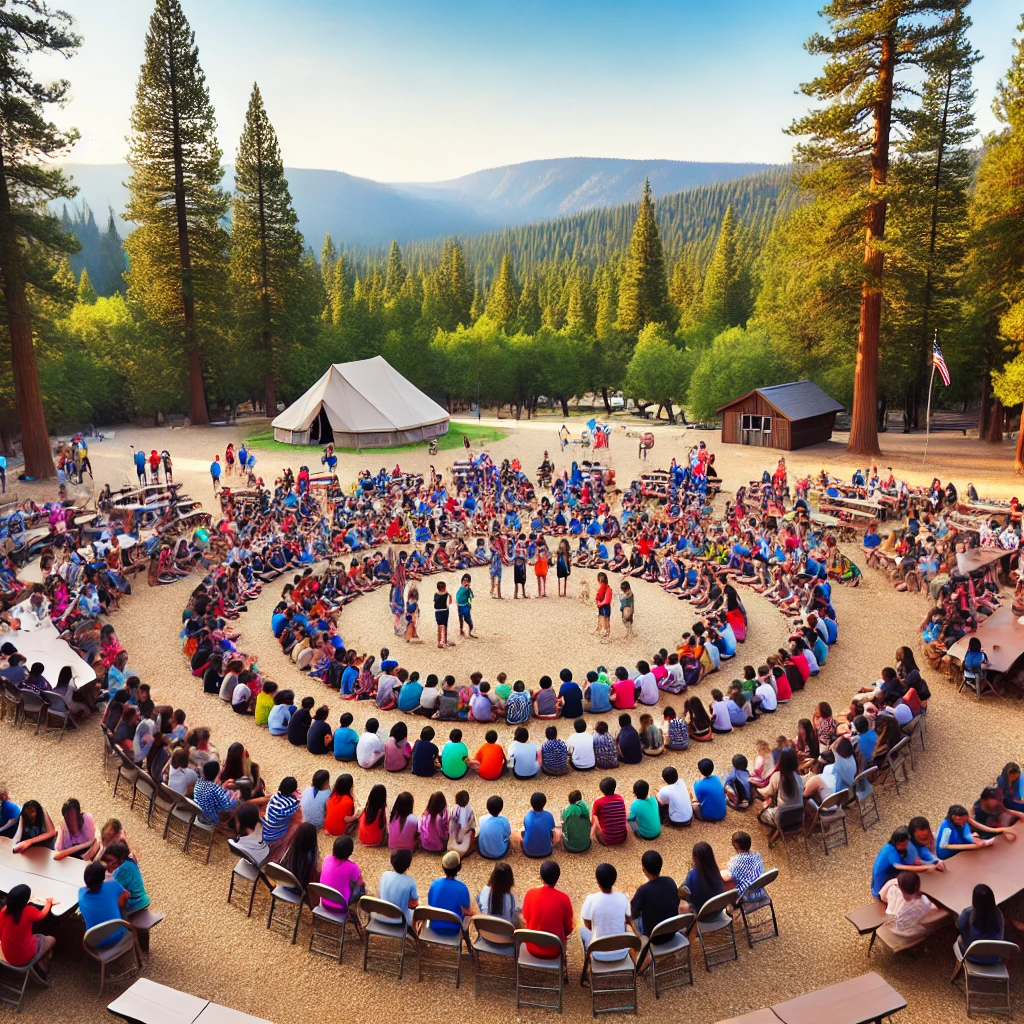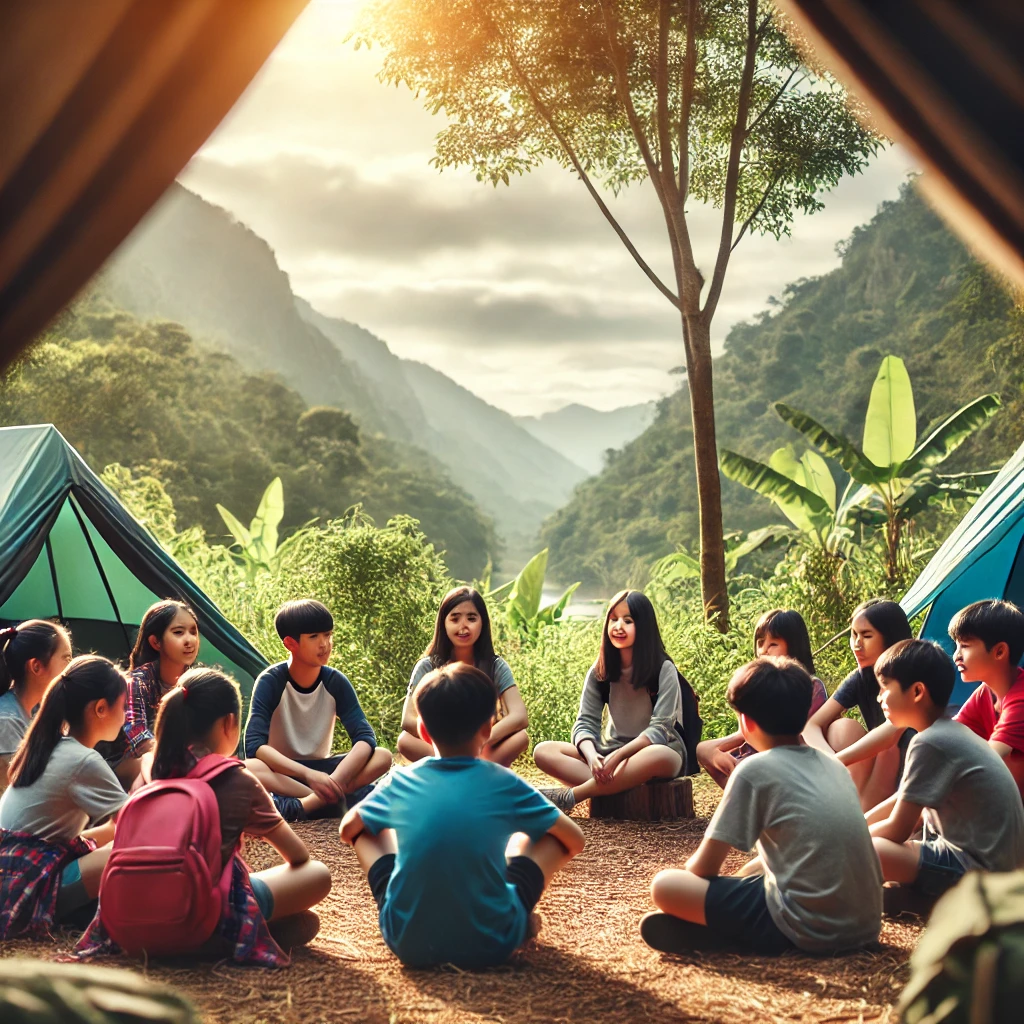What is camp education, and why is it important?
Camp Education is many things all at once, and it is VERY important!
Camp Education is the label for the unique programming provided by summer and seasonal camp programs all over the world. It is an immersive, experiential learning approach for children and young adults that goes beyond the limitations of the traditional classroom.
Camp Education is a solution to fully prepare individuals to thrive in the diverse, unpredictable environments that characterize our rapidly changing world.
Some children and young adults do not receive Camp Education during their formal educational years. Camp Education International’s purpose is to change that.

Education in schools focuses on academic achievement through structured lessons and exams. This, of course, is critical, but it does not and cannot fully prepare learners for the future workplace. Camp Education emphasizes holistic development through hands-on activities, real-world problem-solving, and social engagement. It fosters essential life skills—such as leadership, teamwork, emotional intelligence, and resilience—by placing participants in dynamic, interactive group-based environments that challenge them to think creatively and adapt to new situations.
Camp Education is the key ingredient in future personal success related to confidence, employability, career longevity, social stability, and ultimately, happiness. Camp-educated individuals are skilled, connected, and flexible people that adjust well to complex situations and demonstrate grit and ability to persevere.
What specifically does camp education do?
Camp Education has 8 Specific Domains, each with their own learning outcomes:
1. Leadership and Personal Development
- Enhanced Leadership Skills: Campers practice leading groups, making decisions, and managing projects, building organic confidence in their leadership abilities.
- Improved Self-Esteem: Participants develop a strong sense of self through overcoming challenges and achieving personal goals, in a group setting without the traditional extrinsic motivators of grades or expectations of mastery.
- Goal Setting and Achievement: Campers learn how to set, pursue, and achieve personal and group goals.
One of the most common statements from children and young adults attending summer camp is: “I feel so much more comfortable taking risks, accepting responsibility, and leading others.”
2. Social-Emotional Learning (SEL):
- Improved Communication Skills: Campers learn to express themselves clearly and listen actively, leading to better interpersonal relationships.
- Increased Perspective-Taking Ability: Participants develop greater empathy by working in diverse teams and understanding different perspectives.
- Conflict Resolution Abilities: Campers gain tools and experience to navigate and resolve conflicts constructively.
Camp provides a unique environment for these SEL opportunities as they occur naturally when people belong to a small group or cabin for the majority of the day and camp session. Living and working closely with others requires advanced social skills, which is a basic expectation of the camp experience.
3. Practical Skill Development
- Enhanced Problem-Solving Skills: Participants engage in hands-on activities (STEM and other) that quickly develop their ability to think critically and solve complex problems, often with others.
- Practical Life Skills: Campers acquire useful outdoor and “real-life” skills such as first aid, cooking, and outdoor survival techniques.
- Increased Interest in Non-academic Learning Opportunities: Participants are able to follow an early-childhood model of choosing scaffolded learning activities based on their interests, and often challenge themselves much more than in traditional classrooms.
Campers often report a deep satisfaction in having practiced and mastered a non-school skill at camp: learning to waterski, completing a challenging climb, becoming skilled at archery, or being able to build a fire or cook in the outdoors.
4. Outdoor Education and Environmental Stewardship
- Increased Environmental Awareness: Participants develop a deeper understanding of the value of the outdoor world, by spending time directly in it.
- Stewardship Skills: Campers learn practical ways to care for the environment, such as recycling, sustainable living, and wildlife preservation.
- Connection to Nature: Participants gain an appreciation for the natural world, fostering a lifelong commitment to environmental responsibility.
Camp Educated individuals are the future stewards of the outdoors, as well as the future leaders of organizations ensuring both protection and access to the national parks and other wildlife areas to be preserved by society.
5. Creativity and Innovation
- Enhanced Creative Expression: Campers explore and develop their artistic talents through various mediums, such as music, drama, and visual arts.
- Confidence to Innovate: Participants gain direct experience in translating creative ideas to actionable projects, increasing their confidence in innovation and entrepreneurship.
- Collaboration on Creative Projects: Campers learn to work together on group projects, combining their unique talents to create something meaningful.
6. Physical Education and Adventure
- Improved Physical Fitness: Participants engage in regular physical activity, improving their overall health and physical well-being.
- Enhanced Teamwork and Cooperation: Campers learn to work together in sports and adventure activities, building trust and camaraderie.
- Increased Resilience and Perseverance: Through challenging physical activities, participants build resilience and learn to push through obstacles.
7. College Preparedness
- Independence and Responsibility: Campers gain immediate experience and skills in adopting schedules, following through on commitments, and taking responsibility for tasks.
- Critical Thinking: Participants develop critical thinking skills as they are required by the camp experience, that directly translate to the future college environment.
- Emotional Resiliency: Campers experience "moderate stressors" while at camp, learning to regulate their emotions and develop individual resiliency skills.
8. Health and Mindfulness
- Improved Mental Health: Participants practice mindfulness techniques that help reduce stress and improve overall mental well-being.
- Greater Self-Awareness: Campers develop a deeper understanding of their emotions and thoughts, leading to better self-regulation.
- Healthy Lifestyle Habits: Participants learn and practice habits that contribute to long-term physical and mental health.
What is the history of camp education?

Camp Education has a long history, beginning with youth development professionals in the United States in the mid-1800s.
You can access a very comprehensive timeline of the history of summer camps in the US here.
Much has been written about the intent behind summer camps from the earliest efforts. Camp Education was strongly characterized by worries from adults that traditional education was not enough, and that summer time off was dangerous to youth development.
“Boys and girls (especially those whose parents did not need them to be wage-earners) were spending more time than ever before in the regimented atmosphere of the schoolroom, without the opportunity to apply their book knowledge to the real world. For the middle- and upper-class youngsters who most concerned camp organizers, the long summer vacation offered an escape from this regimentation, but a school break unconnected to farm chores was still a relatively new—and worrisome—phenomenon in the 1890s. Camp director Henry W. Gibson characterized it as "a period of moral deterioration with most boys … who have heretofore wasted the glorious summer time loafing on the city streets, or just as disastrously at summer hotels or amusements places.“
Abigail A. Van Slyck – A Manufactured Wilderness: Summer Camps and the Shaping of American Youth, 1890-1960
It was not long until the brightest educators began to see and promote the value of camp education.
“I have a conviction that a few weeks spent in a well organized summer camp may be of more value educationally than a whole year of formal school work.”
Charles William Eliot – 21st President of Harvard University
Currently, the summer camp industry in the United States is significant, with estimated revenues expected to reach approximately $23.1 billion by 2024. This includes various types of camps such as leisure, adventure, and educational camps. The industry is experiencing steady growth, driven by increasing interest in outdoor activities and wellness, as well as parents seeking enriching experiences for their child.
What are the benefits of CEI membership?
Join CEI and become part of a global community of camp professionals, educators and youth development professionals that advocate for and believe in the power of Camp Education. Membership provides you with networking, professional development, and access to the CEI learning library and events. (access to valuable training, education, and resources to implement camp education in your own organization) And MEMBERSHIP IS FREE!
Camp Education International (CEI) was founded in 2020 on the campus of Stanford University in California by Stuart Jones and Jeff Gamble, American camp professionals with over 60 years of combined experience in the camp education field.
CEI supports one powerful mission: Every Child Deserves Camp Education. We invite youth-serving organizations worldwide to join CEI to make this a reality for children everywhere.
